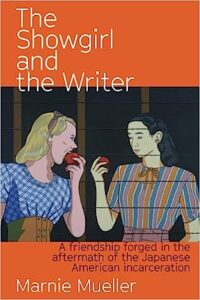Review — THE SHOWGIRL AND THE WRITER by Marnie Mueller (Ecuador)
 The Showgirl and the Writer: A Friendship Forged in the Aftermath of the Japanese American Incarceration
The Showgirl and the Writer: A Friendship Forged in the Aftermath of the Japanese American Incarceration
by Marnie Mueller (Ecuador 1963-65)
Peace Corps Writers
488 pages
July 2023
Reviewed by John Thorndike (El Salvador 1966-68)
•
This powerful mix of personal and national history unfolds in three parts. First is Marnie Mueller’s own story, starting with her birth in the Tule Lake concentration camp for Japanese Americans, where her Caucasian parents were on the staff. In this relatively short section she describes her childhood, marriage, and life as a novelist. A longer second section traces her years as friend and caregiver to Mary Mon Toy, the showgirl of the title, an actress, dancer and singer of Japanese heritage who was incarcerated in 1942 in another of the “segregation camps.” Mary claims to be half Japanese and half Chinese, something Mueller believes during the years she takes care of the now-elderly showgirl.
“I have a strong tendency,” Mueller writes, “—some of my friends would say a compulsion—to be pulled in by another person’s neediness, especially when I’m feeling vulnerable.” It’s a line that will resonate throughout the book, and the source of much tension as Mueller takes over the guardianship of the increasingly needy Mary Mon Toy. By the end, the author is Mary’s health care proxy, power of attorney, and executor. “In hindsight I see myself rushing headlong into a deep hole of accountability, fueled by my eagerness to find a solution to an insoluble problem—the care of an elderly person in modern-day America.”
Though uneasy on her feet, Mary is still full of life. Her mind is usually sharp, and most readers will find her enchanting. She’s fond of talking about, and sometimes exaggerating, her past. She parades her stint on Broadway, her touring years, the many famous people she knew, and her affair with Marlon Brando. Mueller sometimes doubts the stories, but is steadily drawn in by her charismatic older friend.
Looking after Mary becomes ever more demanding, and sometimes overwhelms the author. Mueller sums it up with this passage about growing older: “We’ve come smack up against the wall of old age: you no longer have the energy or physical stability to go out on your own, many of your friends have died or fallen away, and those who are left simply don’t have the desire or the time to shepherd you around. Mostly, though, they just don’t want to. As your days become increasingly circumscribed and dull, so goes your once-vibrant mind, making you a less sought-after date. In the end, nothing can make up for the rhythm and excitement of the life you once conceived and built; it will never exist again.”
Brutal, but true.
Only halfway through the book, Mary Mon Toy dies at the age of 92. And what, I wondered, could possibly come next? What could hold my attention as deeply as what I’d read so far? I was happily surprised. In the final section of the book, Mueller recounts her extensive research into Mary’s life, often focusing on her secrets and invented stories. Starting soon after she got out of her segregation camp, Mary began to claim a Chinese, rather than a Japanese father. This was a response to the widespread prejudice against Japanese Americans after Pearl Harbor, an intolerance that made it difficult for Mary to find the singing and acting roles she aspired to. Mueller, who grew up hiding the Jewish half of her parentage, identifies with Mary’s need to veil her past.
The incarceration of Japanese Americans was one of the most shameful events in the history of our country—and a great burden, even decades later, to those who were confined. When Mary was released, “she reentered an America that vilified her race and ethnicity, and placed limitations on her aspirations as an artist.” To survive in her showgirl world, “she had to use every means at her disposal—her talent, her beauty, her allure, her intellect, her seductiveness, her humor, and her wiles.” Mary is alluring, but her battles took a toll. “Only through sex, imperious demands, charming storytelling, or coy manipulation could she allow herself to engage emotionally.”
Marnie Mueller’s own revelations light up the final section of the book. By studying the showgirl, the writer learns about herself. “In order to understand the impact of the Incarceration on Mary, I had to see us as separate beings, and at the same time, try to get to the bottom of my own extreme depreciation of self.” As she explains her past, “I camouflaged my need to be taken care of, and my shame at having such a need, by obsessively taking care of others…. I wanted love, so I gave it. I wanted succor, so I soothed another.”
My guess is that most great books are an exploration by the author into their own nature. The reader won’t learn much unless the author learns it first. The Showgirl and the Writer is an entrancing memoir, tangled up with a disgraceful piece of U.S. history, and a portrait of a fascinating woman. The book is long and involved, and I hung on every paragraph.
•
Reviewer John Thorndike (El Salvador 1966-68) graduated from Harvard, took an MA from Columbia, and spent two years in the Peace Corps in El Salvador and two, with his wife and child, on a backcountry farm in Chile. Eventually he settled with his son in Athens, Ohio, where for ten years his day job was farming. Then it was construction.
His first two books were novels, followed by a memoir, Another Way Home, about his wife’s schizophrenia and his life as a single parent. A second memoir, The Last of His Mind, describes his father’s year-long descent into Alzheimer’s, and was a Washington Post Best Book of 2009. His third novel, A Hundred Fires in Cuba, follows the love affair of a young American photographer and Camilo Cienfuegos, one of the heroes of the Cuban Revolution. The World Against Her Skin, Thorndike’s latest book, is a half-fictional evocation of his mother’s life.

A beautiful and discerning review of what I perceive to be a hugely empathetic book, a solipsism in the end, in the deep end, of two giving souls who gift us with inspiration. Thanks John! Thanks Marnie!
Dear Marnie,
My sincere apologies for my misuse of “solipsism.” In my ignorance I misunderstood the word and I’m sure your new book is anything but the s. word. I hope to read it and review it. Do you know of any sites that would be open to accepting such a review? Failing that there’s always Amazon. A hearty congratulations, Marnie!!!
Best wishes,
Eric Madeen
Dear Eric, Thank you very much for your apology. I’ve made similar mistaken uses of words. It’s always particularly embarrassing when one is a writer! And a fine writer, which you are. I’ve taken to Googling words when I have even a hint of possibly being wrong. I have been saved by Google many times, which says something about my own vocabulary limitations.
Not only are you a good writer, but you’re an honorable man for admitting the mistake.
Kind regards,
Marnie
Great review John!
Eric and Marnie, Yes as writers we do have a mandate to pay attention to words. I start each day with the podcast “Word of the Day” by Merriam-Webster. Today’s word, “bellwether.”
I often consult, “Dictionary.com” with questions of a word’s meaning or to be sure the word I want to use exists…a never-ending process.
Cheers,
Mark